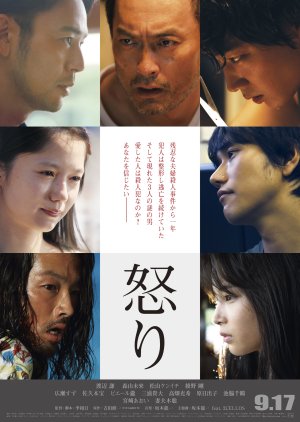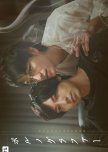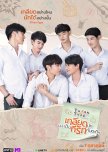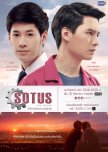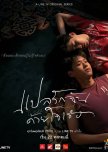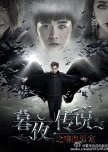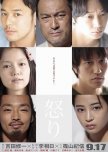
With a talented and star-studded ensemble of some of Japan's most famous names, it's no surprise that Rage shines. Ken Watanabe needs no introductions, the male leads: Go Ayano, Matsuyama Kenichi, Tsumabuki Satoshi and Moriyama Mirai who all have already made names for themselves. Aoi Miyazaki, who's been in the industry since she was four. And the up and coming, Hirose Suzu. I also want to mention the relatively unknown Takara Sakumoto who makes his debut here as an actor to watch out for.
I'll tell you why Rage is a very raw film -- it depicts Japanese rigidity. I don't say that to provide a negative interpretation but there is a lot of suppressed emotions in the society. Hence, these suppressed emotions are bottled up, be it sadness, be it anger, be it loneliness—whichever. The need for catharsis is just too high and I think Rage perfectly depicted that need and gave these characters that chance.
As I watch this film, I too, want to scream, I too want to have a tantrum, I too, want to throw things—I want to release bottled-up feelings. Lee knows how to build-up these emotions that echoes the characters' as much as he builds up the narrative. He knows how to give you the "feels" combined with Ryuichi Sakamoto's score that's just filled with too much dramatic tension, you too, would want to explode.
There are two overlaying narratives in the film, all of which were very cleverly linked not only by the murder and that the three men emerge as potential suspects but are also connected through dialogue, through visuals and through sound. The sound is really the one, to me, pushes the plot. The sounds emit the emotions, emit the passion and emit everything. Lee connects visuals from Tokyo, from Chiba and from Okinawa together with the dialogues and the sound. I think it's a very refreshing way to do so and it makes the three narrative feel balanced.
These narratives, on their own are unique but still keeps the underlying theme of trust and connection. Go and Satoshi's narrative touches on their sexuality. It is very refreshing to see an aloof, almost-silent Go that contrasts with Satoshi's fearless and enthusiastic nature. Miyazaki, Watanabe and Kenichi's narrative touches on acceptance and of family. The lonely, almost weird Kenichi forms a connection with Miyazaki, who has just been rescued by Watanabe (her father) from an abusive sex work. Suzu, Mirai and Sakumoto brings us to Okinawa, of a simpler life, of youth and of curiosity but to me is really the one that resonated with me the most.
If you really want to know who the murderer is, I'd say look at the narrative that's filled with the most rage. Look at which narrative makes you feel the angriest, the one that filled you most with rage and you will have your answer. By the second hour of the film, where it's filled with tears and screaming and throwing, you'd know. The reveal isn't what matters, it's their stories that do. Lee knows how to juggle the three narratives that three of the suspects are all likely to be the killer.
The plot does, disintegrates into a cornucopia of crying, weeping, wailing and just a lot of those (all three narratives stitched together too) so it does overwhelm and to itself, an overexcess portrayal of the characters and their narratives. But nevertheless, very very very impressive performances from the cast.
All I have to critique is probably the lack of a backbone for the killer himself. There is an ongoing question of where the rage comes from. Is it simply from surpassed emotions? Is it simply from being laughed at his pitiful state? Or is it from being pitied? We are never given a straight answer so we can only interpret.
The visuals are stunning. The opening shot of a bird's eye view of Tokyo, to the clear waters of Okinawa to the colorful houses of Chiba—it's beautiful. The visuals are great transitions and there is never the lack of varying colors to depict the scene's mood.
Finally, I just want to say that I will never look at Hirose Suzu the same again. I'm only commenting on her the most because her films are the one I've seen the most. I used to say how Suzu knows how to act, she can cry but there is blankness in it (compared to the way Fumi Nikaido tries) but seeing her, in a very very very mature role, I'm taking back what I said—Suzu deserves all the spotlight she's getting. And with such roles, it's no doubt, she can do more.
Also, Takara Sakumoto making his debut here impresses.
Ultimately, the film is about trust and connection. No, it doesn't tell you who to trust and stuff but it does tell you how it feels when someone you trusts betrays you or someone you choose not to trust just decides to leave.
Was this review helpful to you?

This review may contain spoilers
Trust & Suspicion ... what if you get it wrong?
WOW ... this was a very profound movie. Trust and suspicion ... it really is a case of walking on a razor's edge. How can you really know when it is safe to trust ... or when it is best to be suspicious ... and what if you get it wrong ... can you survive that, can you move forward or will you be consumed by rage and possibly contribute its perpetuation on to the lives of others?This movie really plunged into the depths of these questions and the ensuing rage and despair when it goes wrong ... and if the situation is redeemable / survivable. It is gritty, confronting and very raw ... the way it was filmed, scripted and acted was nothing less than masterful ... it is like you are grabbed and literally thrust into the lives of the characters and forced to being a witness to the unfolding events which were so realistically portrayed and delivered to the screen.
TRIGGER WARNING: confronting rape scene. I had to skip the actual rape scene ... I couldn't just sit there and watch it without doing anything (ノಠ怒ಠ)ノ ... I was so wild about those rotten mongrel b@stards ... they were in positions of trust and are supposed to protect civilians ... not to get pleasure from brutally raping an innocent girl. Where is Sha Qing when you need him ... where is Ryuuk, write those b@stards' names in your Death Note and give them a very slow and excruciating death ... how about that for rage at the abuse of trust.
Hmmm which brings to mind something Orson Scott Card (an American author who wrote Ender's Game) said that really nails the connection between trust, suspicion and rage:
"There's a sort of rage a man feels when he's been deceived where he most trusted. It compares to no other anger."
And in the end, after all has been said and done, what is left ... ? ...
loss, grief, rage, death (yours and/or others) <> forgiveness, relief, moving forward, alive
Was this review helpful to you?

Was this review helpful to you?

Lee Sang-il sebagai sutradara dalam film ikari ini berhasil membuat thrilling pengadeganan yang pas bahkan menurut saya dia bisa memaksimalkan dan mengeksplore akting masing-masing aktornya. Ikari yang berarti Amarah/Kemarahan berhasil ditunjukkan Lee Sang-il dalam klimaks film setelah melalui proses panjang dan perubahan karakter setelah mengalami rentetan peristiwa yang merubah psikis masing-masing karakter yang memiliki cerita sendiri pada 3 kota yang berbeda. Namun, Interpretasi yang kemudian muncul pada film ini menurut saya lebih mengarah kepada sebuah nilai “kepercayaan”. kepercayaan terhadap seseorang yang belum dikenal yang pada akhirnya masing-masing karakter mengalami resiko yang berbeda-beda. Sehingga interpretasi yang saya simpulkan mengenai nilai pada film ini adalah “kepercayaan yang mengakibatkan sebuah penyesalan yang mendalam”hingga mengakibatkan masing-masing karakter mengekspresikan kemarahan dan amarahnya dengan cara yang berbeda-beda.
Namun sayangnya, dari multiple protagonis yang diikuti sepanjang film ini semuanya masih terasa tidak jelas. Kita hanya diperlihatkan karakterisasi tanpa pernah diperlihatkan dan dijelasan tujuan protagonis pada film ini apa? Sehingga saya pribadi akhirnya tidak bisa berempati pada karakter yang ada.kekuatan dari tujuan karakter yang tidak jelas menjadikan saya merasa tidak nyaman mengikutinya. Jika melihat perbandingan film yang mengunakan multiple protagonis yang dimana masing-masing karakternya mempunyai true karakternya adalah film 3 Idiot, dimana multiple karakter itu adalah Seorang pintar dan ingin belajar tapi tak punya akses (Rancho), seorang ingin menjadi fotografer tapi dipaksa orang tuanya kuliah engineer (Farhan), seorang yang punya permasalahan pada rasa takutnya menghadapi hidup dia hanya berdoa sepanjang waktu dan takut berusaha ingin mengubah nasibnya dengan masuk kampus terbaik (Raju).
Kita tanpa sadar terseret kedalam pusaran cerita karena empati terhadap ke tiga karakter tersebut. Jadi jika kembali pada karakter yang dimiliki di film ikari ini, saya hanya membaca bagaimana ketika karakter mendapat tekanan yang besar kemudian mengekspresikan ketidakberdayaannya.
Akan tetapi, bukan berarti ini adalah film yang tidak bisa untuk dinikmati. Namun saya menilai secara story telling masih terdapat beberapa point yang belum menguatkan dan membuat saya belum bisa menikmati secara utuh jalannya cerita film ini.
Was this review helpful to you?

